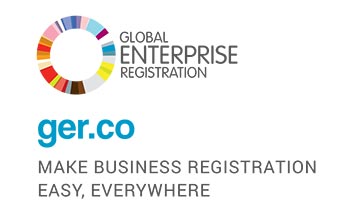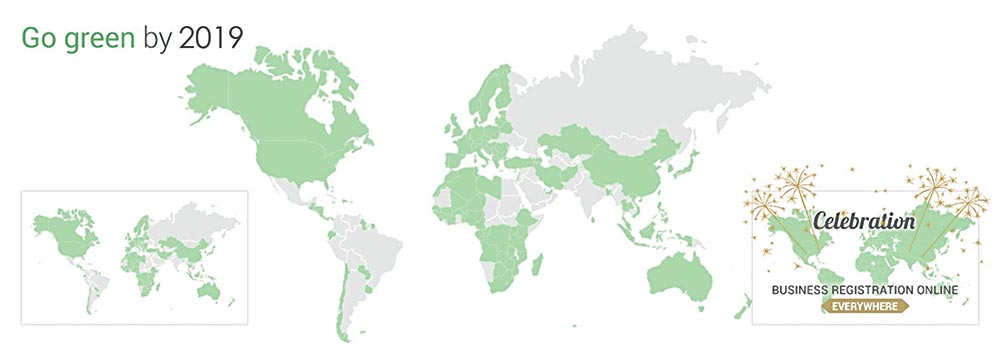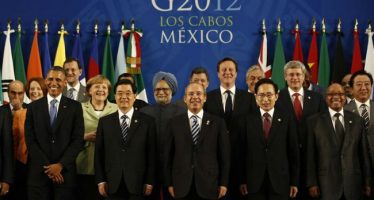Ann Low, US Department of State: Go Green by 2019 – Make Business Registration Easy Everywhere by 2019
 The “Go Green by 2019” campaign is designed to promote transparent and user-friendly business registration processes worldwide. It is a joint initiative of the Kauffman Foundation’s Global Entrepreneurship Network (GEN), the United Nations Conference on Trade and Development (UNCTAD) and the U.S. Department of State. The campaign uses non-traditional partnerships, global collaboration and information technology to address root causes of poverty, corruption and opaque government administrative processes. The “Go Green by 2019” campaign is built around the Global Enterprise Registration website, www.GER.co, which is the world’s first platform that provides, in one location, links to all official business registration websites in the world and ratings of each website’s user-friendliness.
The “Go Green by 2019” campaign is designed to promote transparent and user-friendly business registration processes worldwide. It is a joint initiative of the Kauffman Foundation’s Global Entrepreneurship Network (GEN), the United Nations Conference on Trade and Development (UNCTAD) and the U.S. Department of State. The campaign uses non-traditional partnerships, global collaboration and information technology to address root causes of poverty, corruption and opaque government administrative processes. The “Go Green by 2019” campaign is built around the Global Enterprise Registration website, www.GER.co, which is the world’s first platform that provides, in one location, links to all official business registration websites in the world and ratings of each website’s user-friendliness.
The GER.co website shows that 69 countries in the world have not put their business registration processes online. Only 25 countries have developed single windows to allow easy online registration; of those, only two (Switzerland and Denmark), provide all mandatory registrations and certificates online. The remaining 127 countries with online business registration processes offer information portals describing those processes. The best of these tell a person where to go to register a business, what to do, how much it will cost, and how long it will take, and they provide links to legal justifications for all required registrations. However, of the 127 information portals online in June 2015, only 23 had all that information, and only another 7 described all of the mandatory registrations a business needs to operate legally. There is enormous potential for improvement.
“By focusing attention and resources on government services that touch peoples’ lives, governments can build trust between their populations and the administrations that serve them.”
– Assistant Secretary of State, Economic and Business Affairs, Charles H. Rivkin
This lack of clear, complete and accurate information about business registration procedures is indicative of a bigger problem. Many government processes, from licenses to building permits to visas and immigration applications, are exceedingly complex and often opaque. Frank Grozel, Coordinator of UNCTAD’s Business Facilitation Program (www.businessfacilitation.org) explains that, “within governments, many administrations act in silos and see the world not from their customer’s standpoint, but from their administration’s standpoint. Business registration typically involves registrations with four or more administrations (business registry, national and/or state/municipal tax identification number, social security, pensions). If those administrations don’t collaborate, the customer won’t know whether he’s actually done all the required registrations or just some of them, and he won’t know in which order to complete the procedures most efficiently.” Such collaboration across administrations takes time, leadership and political will. It’s hard.
Simplification requires even more perseverance and political will. The first step towards simplifying a business registration process is documenting the existing procedures. According to Grozel, “seeing a process documented in its entirety often shocks government officials, who each understood their piece of the puzzle but had no idea the puzzle comprised 84 pieces. Typically, when governments see their processes in detail, they want to simplify; then begins the hard work of administrative collaboration and compromise.” Over the past 10 years UNCTAD’s business facilitation program has helped 27 countries put 1,786 administrative procedures online, and in the process reduced the number of steps required to register a business by 80 percent on average.
James Zhan, Director of the UNCTAD Investment Division, explains, “UNCTAD and the countries with which it works have accomplished administrative simplification by creating smarter workflows and eliminating unnecessary steps that were not required by law. My division produces Investment Policy Reviews that advise governments how to encourage foreign direct investment. We recognized complex administrative procedures as a barrier to investment and established the business facilitation program to find solutions. Each country’s situation is unique, but the basic types of information businesses need are the same, whether for domestic or foreign investors. The great thing about this program is that developing countries that embrace reform can, and do, excel. Some of the most user-friendly business registration websites in the world are in developing countries. Governments and businesses can support those reformers by taking notice, investing in their countries and suggesting additional procedures to simplify.”
According to a 2009 report by the Organization for Economic Cooperation and Development (OECD), 1.8 billion people work in the informal economy, out of a global working population of 3 billion [1]. That is 60% of the global workforce, with the proportion projected to increase to around 66% by 2020 [2]. Unregistered businesses can’t open bank accounts, so they can’t take out loans to grow, and they don’t have access to health or social insurance. The same report estimates that the informal sector’s contribution to GDP is 19% in transition countries, 30% in Latin America, 31% in Asia, and 64% in Sub-Saharan Africa [3]. According to Zhan, “formalizing even just a small portion of this sector could increase government fiscal revenue and support the infrastructure development vital for domestic growth and attracting foreign investment.” A 2010 report by UNCTAD estimates that potential annual income to state budgets derived from taxation of the informal sector would be about 6% of regional GDP for Latin America and the Caribbean, 5% of regional GDP for Asia, and 11% of regional GDP for Africa, .e.g. amounts that are in most cases significantly larger than annual official development assistance or foreign direct investment flows to those regions [4].
Use GER.co: Your visit to GER.co tells governments that simple administrative procedures matter. More site traffic makes simple processes a priority.
- Please link GER.co to your website, encourage site usage, and advocate for simple administrative procedures globally. Computer code for linking your website to the GER.co website is part of the “Go Green by 2019” promotional materials. The GER.co website is a great resource for chambers of commerce, any organization promoting international trade and investment, any global business, and entrepreneurs everywhere.
- Governments: do a self-assessment of your website to see it from the user’s point of view. If your business registration processes are not online, learn about solutions on GER.co.
- Businesses owners: tell us about your experiences registering a business by rating the website you used. Go to the GER homepage and click the “rate website” banner by the economy’s name.
- Thank you for helping the world to go green by 2019!
Ambassador Charles Rivkin, Assistant Secretary for Economic and Business Affairs at the U.S. Department of State, emphasizes that “business registration can play a catalytic role in financing sustainable development and stabilizing fragile states. By focusing attention and resources on government services that touch peoples’ lives, governments can build trust between their populations and the administrations that serve them. Such trust is the bedrock on which rests rule of law. Simple business registration procedures, coupled with incentives to register, make it easier for entrepreneurs to start businesses and can increase a country’s tax base. Add a simplified tax regime and compliance results.” According to Rivkin, “countries can enter a virtuous circle of increased business registrations generating more tax revenues, leading to better services, allowing more economic growth, leading to more business registrations.” It is for these reasons that the February 2015 White House Summit to Counter Violent Extremism identified GER.co as a community-led solution to address extremism by facilitating economic opportunity through entrepreneurship, and good governance (www.state.gov/r/pa/prs/ps/2015/02/237647.htm, point 9).
The GER.co website is new, but it is already having an impact. In April 2015, officials in charge of business climate reform in the West African Economic and Monetary Union (WAEMU) member States (Benin, Burkina Faso, Côte d’Ivoire, Guinea-Bissau, Mali, Niger, Senegal and Togo) announced their decision to pursue administrative simplification, in particular by providing entrepreneurs with online registration services. According to their press release (www.uemoa-climatdesaffaires.com/pages/ComPress_suite.php), “one of the objectives is to undertake reforms beyond traditional indicators (Doing Business, World Economic Forum, Mo Ibrahim Foundation, etc.) and improve their ranking in the Global Enterprise Registration index (www.ger.co). Online services will stimulate entrepreneurship, help formalize micro-enterprises, increase government revenues and reduce corruption.”
“Reducing the number of steps required to start a business saves entrepreneurs and investors time and reduces opportunities for corruption,” states Jonathan Ortmans, President of the Global Entrepreneurship Network (GEN) and founder of Global Entrepreneurship Week. A 2002 study found that business entry costs as a percentage of GDP per capita were an astonishing 94% and 67% for Africa and Central Europe, respectively, versus a mere 3% for high income countries [5]. Complex administrative processes pose an enormous barrier to small and medium-sized enterprises which, lacking the resources to comply with such processes, forego potential business expansion. According to Ortmans, “for individuals, GER.co’s assistance with business registration brings the dignity of a step towards participating in the formal economy, and for governments, the platform helps identify the best business registration practices, simplify their own business registration procedures, and foster an inclusive global economy.”
The “Go Green by 2019” campaign is a call to action for governments everywhere to make their business registration processes clear and simple by 2019. This will facilitate economic growth and good governance globally. If governments see that they can make business registration processes easy, they will be inspired to simplify other administrative procedures, which will improve investment climates exponentially.

Grey: Countries/economies that have not put their business registration processes online are grey on the map. Green: When a government’s website meets the ger.co criteria, the country/economy becomes green.
The campaign targets governments with two messages:
- To governments that have not put their business registration processes online: please do so. (See “How it works /Not listed” on GER.co for a list of 69 economies without online business registration websites. These economies are grey on the GER.co world map)
- To all governments: please clarify and simplify business registration processes. (Start the simplification process by completing the “Governments/Assess your website” form on GER.co).
The GER team rates each country’s official business registration website for its user-friendliness, using a scale of zero to ten green dots, with more green dots signifying better processes: hence, “going green”. According to Ortmans, “governments can help entrepreneurs everywhere by creating and maintaining business registration websites that rank high on the green dot scale, continuing their efforts to simplifying procedures, and putting more government administrative procedures online.”
References
[1] OECD. (2009, March). Is Informal Normal? Messages, figures and data.
[2] UNCTAD. (2010, February 15). Public investment in administrative efficiency for business facilitation- sharing best practices, 5.
[3] Ibid., 6.
[4] Ibid., 7.
[5] Bannock, G. et al. (August 2002), 15.
About the Author
 Ann Low is Deputy Director of the Office of Investment Affairs at the U.S. Department of State, and the architect of the GER.co initiative and Go Green by 2019 campaign. She has over 25 years of experience working on multilateral and economic affairs. Ms Low has served as the US Representative to the Asia Pacific Economic Cooperation (APEC), the OECD Working Party on State Ownership and Privatization Practices, and several United Nations’ bodies (UNCTAD, UNDP, UNICEF, DHA, ECOSOC, UNGA). Ms Low graduated from Georgetown University’s School of Foreign Service and has a Masters of Management degree from Northwestern University’s Kellogg School of Management. She has served as a visiting diplomat and adjunct professor at Columbia University.
Ann Low is Deputy Director of the Office of Investment Affairs at the U.S. Department of State, and the architect of the GER.co initiative and Go Green by 2019 campaign. She has over 25 years of experience working on multilateral and economic affairs. Ms Low has served as the US Representative to the Asia Pacific Economic Cooperation (APEC), the OECD Working Party on State Ownership and Privatization Practices, and several United Nations’ bodies (UNCTAD, UNDP, UNICEF, DHA, ECOSOC, UNGA). Ms Low graduated from Georgetown University’s School of Foreign Service and has a Masters of Management degree from Northwestern University’s Kellogg School of Management. She has served as a visiting diplomat and adjunct professor at Columbia University.
You may have an interest in also reading…
World Bank Group: Should Oil Exporters Shift Capital Stock to Renewables?
As the Financial Times pointed out recently, oil companies such as ExxonMobil and Shell would, under measures considered for the
G20 Summit: Merkel still wants both Austerity and Growth in the Eurozone… but still no clue as to who will pick up the tab
Angela Merkel brushed off criticism of her focus on austerity, as the leaders of the world’s 20 largest economies focused
Otaviano Canuto, World Bank Group: Commodity Super Cycle to Stick Around a Bit Longer
Some analysts have predicted that the commodity price boom has played itself out. However, natural resource-based commodity prices (with the
















































































